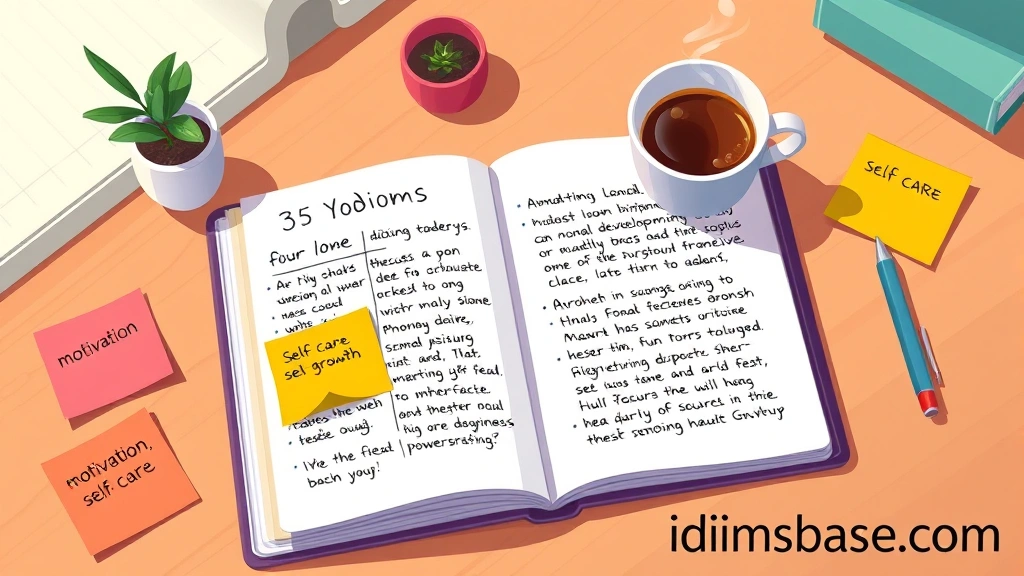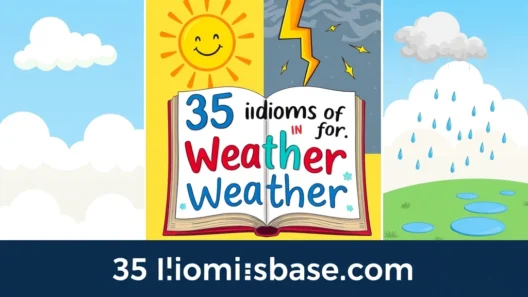Have you ever found yourself searching for just the right phrase to describe your feelings or a situation you're in? Sometimes, direct words just don't capture the nuance, do they? That's where idioms come in! They're like secret codes, adding color and depth to our conversations and thoughts.
Imagine being able to express complex ideas with a simple, vivid phrase. It's not just about sounding smart; it's about communicating more effectively, connecting with others, and even understanding yourself better. In a global world, understanding these common English idioms can be a real superpower, opening doors to richer interactions and clearer self-expression. Ready to dive in? Let's explore 35 fantastic idioms you can use to describe yourself and your experiences!
Why Idioms Matter for "You"
Before we jump into the list, let's chat about why these little linguistic gems are so important. Idioms aren't just quirky phrases; they're windows into culture, history, and often, human nature. For you, they offer:
- Enhanced Self-Expression: Go beyond basic vocabulary to truly articulate your unique personality and emotions.
- Improved Communication: Understand and be understood more easily, especially in casual conversations.
- Cultural Connection: Grasp the subtleties of English conversation, making you feel more at home in English-speaking environments.
- Cognitive Boost: Learning idioms expands your mental flexibility and problem-solving skills.
So, let’s get started on those 35 idioms that can help you express yourself with flair!
35 Idioms to Describe Yourself and Your Experiences
Here are 35 wonderful idioms, perfect for adding a touch of personality and precision to your language.
- A chip off the old block: You're very similar in character or behavior to one of your parents. "My dad loves to tinker with cars, and I'm a chip off the old block – always under the hood!"
- A wet blanket: You're someone who spoils other people's fun by being negative or unenthusiastic. "Don't be a wet blanket, come join the party!"
- A busy bee: You're a very active, industrious, and hard-working person. "I've been a busy bee all morning, getting everything ready."
- A lone wolf: You prefer to do things by yourself rather than with a group. "Sometimes I feel like a lone wolf, enjoying my own company."
- A night owl: You're a person who tends to stay up late at night. "I'm definitely a night owl; my best work happens after midnight."
- An early bird: You're a person who wakes up early in the morning. "My grandmother is an early bird, always up with the sun."
- A people person: You're someone who is good at interacting with different types of people. "I consider myself a people person, I love meeting new folk."
- A creature of habit: You're someone who likes to do the same things in the same way, often at the same time. "I'm a creature of habit; my morning routine is sacred."
- A social butterfly: You're someone who loves to socialize and has many friends. "She's a real social butterfly, flitting from one gathering to another."
- A big fish in a small pond: You're an important person in a small group or organization. "After moving to the city, I realized I was no longer a big fish in a small pond."
- A loose cannon: You're someone who is unpredictable and can cause a lot of damage if not controlled. "He's a bit of a loose cannon, so be careful."
- A spring chicken: You're not young anymore (often used in the negative). "At 50, I'm no spring chicken, but I can still outrun some youngsters!"
- A square peg in a round hole: You're someone who doesn't fit in or is unsuited for a particular situation. "I felt like a square peg in a round hole at that formal dinner."
- A heart of gold: You're a very kind and generous person. "She has a heart of gold, always helping others."
- A tough cookie: You're a strong, resilient, and determined person. "Don't underestimate her; she's a tough cookie."
- A copycat: You're someone who imitates or copies another person's actions or work. "My little brother is such a copycat!"
- A dark horse: You're someone who was not expected to succeed or win but does. "He was a dark horse in the competition, but he won!"
- A rolling stone gathers no moss: You're someone who is always moving and changing, and therefore doesn't settle down or accumulate responsibilities. "I've always been a rolling stone, exploring new places."
- A happy-go-lucky person: You're someone who is cheerful and carefree. "My friend is so happy-go-lucky, nothing seems to bother him."
- A born leader: You're someone who has natural leadership qualities. "She's a born leader; people naturally follow her."
- A fair-weather friend: You're someone who is only a friend when things are easy or convenient. "When I lost my job, I realized who my fair-weather friends were."
- A bundle of nerves: You're extremely anxious or nervous. "Before my presentation, I was a bundle of nerves."
- A chatterbox: You're someone who talks a lot. "My niece is a real chatterbox, always telling stories."
- A cool cat: You're a stylish, fashionable, and relaxed person. "He thinks he's a cool cat, always wearing the latest trends."
- A good egg: You're a pleasant, kind, and trustworthy person. "Our new neighbor is a really good egg."
- A live wire: You're an energetic and exciting person. "The new intern is a live wire, full of ideas and enthusiasm."
- A man/woman of his/her word: You're someone who always keeps their promises. "If he says he'll do it, he will; he's a man of his word."
- A sharp cookie: You're an intelligent and perceptive person. "She's a sharp cookie, always quick to understand complex problems."
- A straight shooter: You're someone who is honest and direct. "I appreciate that he's a straight shooter; you always know where you stand."
- A whale of a time: You're having a very enjoyable experience (not directly describing you, but your experience). "We had a whale of a time at the concert!"
- A golden opportunity: You're presented with a perfect chance to do something (describes an experience). "This job offer is a golden opportunity for me."
- A breath of fresh air: You're someone or something new and refreshing. "Her innovative ideas were a breath of fresh air for the team."
- A big softie: You appear tough but are actually very kind and gentle. "He acts all gruff, but he's a big softie underneath."
- A tough nut to crack: You're a person or problem that is difficult to understand or deal with. "The new boss is a tough nut to crack, but I'm trying."
- A couch potato: You're someone who spends a lot of time sitting on the couch, watching TV, and not being active. "After a long week, I'm happy to be a couch potato on Sunday."

Key Takeaways
- Idioms add color and depth: They make your language more vivid and engaging.
- They offer nuanced self-expression: You can describe your personality and experiences with greater precision.
- Context is key: Understanding the situation helps you choose the right idiom.
- Practice makes perfect: The more you use them, the more natural they'll feel.
- Global communication: Idioms are crucial for understanding and being understood in English-speaking contexts worldwide.
| Idiom Category | Examples | What it Means for You |
|---|---|---|
| Personality | A busy bee, a night owl, a social butterfly | Describes your typical behavior or preferences. |
| Character Traits | A heart of gold, a tough cookie, a straight shooter | Reflects your inherent qualities and moral compass. |
| Social Role | A lone wolf, a people person, a big fish | Defines how you interact within groups or society. |
| Situational | A bundle of nerves, a whale of a time, a golden opportunity | Expresses your feelings or experiences in specific moments. |
| Growth/Change | No spring chicken, a rolling stone | Hints at your age, lifestyle, or resistance to settling. |
Frequently Asked Questions (FAQ)
Q1: What exactly is an idiom?
An idiom is a phrase or expression where the meaning isn't obvious from the individual words. For example, "kick the bucket" means to die, not literally to kick a bucket! They add richness and flair to language.
Q2: Why is it important to learn idioms?
Learning idioms is crucial for several reasons! Firstly, it helps you understand native English speakers better, as idioms are very common in everyday conversation and media. Secondly, using idioms makes your own English sound more natural and fluent, allowing you to express yourself more vividly and precisely.

Q3: How can I remember so many idioms?
Great question! Don't try to memorize them all at once. Instead, try these tips:
- Contextualize: Learn idioms within sentences or short stories.
- Visualize: Create a mental image for each idiom.
- Practice: Use them in your conversations or writing.
- Group them: Learn idioms by theme (e.g., personality, emotions).
- Flashcards: Make flashcards with the idiom on one side and its meaning/example on the other.
Q4: Are these idioms used globally, or are some specific to certain regions?
Most of the idioms listed here are widely understood and used across various English-speaking regions (North America, UK, Australia, etc.). However, some idioms might be more prevalent in one region than another. For instance, "a couch potato" is universally understood. If you're unsure about a specific idiom's regionality, a quick online search can usually clarify!
Q5: Can using idioms make me sound more confident in English?
Absolutely! Using idioms correctly shows a deeper understanding of the language and its nuances. It signals that you're comfortable and confident, not just with basic vocabulary, but with the cultural subtleties embedded in the language. It's like adding a secret ingredient that makes your English truly shine.
Q6: Are there any idioms I should avoid using?
Yes, some idioms can be outdated, offensive, or too informal for certain situations. When in doubt, it's always safer to stick to more common and universally accepted idioms, especially in formal settings. The idioms in this list are generally safe and widely accepted for everyday use.
Q7: How often should I try to use new idioms?
Start by focusing on understanding a few new idioms each week. Once you feel comfortable recognizing them, try incorporating one or two into your conversations or writing. Don't force it; let them come naturally as your understanding grows. The goal is effective communication, not just showing off your idiom knowledge!







